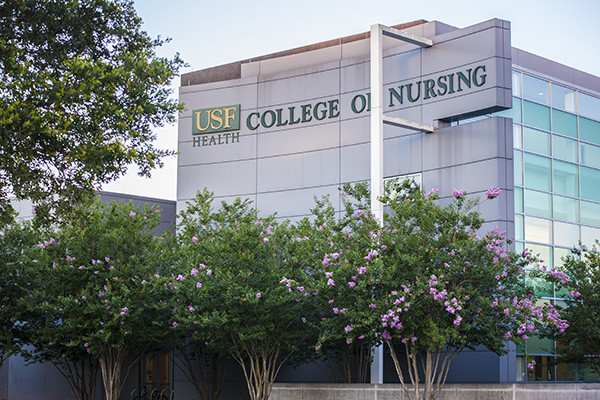USF College of Nursing and Port Tampa Bay collaborate to create new health clinic for seafarers

With maritime workers spending up to several months on cargo ships without any health assistance, the USF College of Nursing and Port Tampa Bay are working together to ensure these vulnerable workers get the medical attention they need.
Through their new partnership, the College of Nursing and Port Tampa Bay are working to create a clinic at the port site for the thousands of maritime workers who arrive in Tampa every year.
“In our first discussions of collaboration, we started asking if there was a chance for an actual clinical presence at the port for the seafarers,” said Susan Perry, former senior associate dean for faculty affairs at the College of Nursing. “From this came the idea of utilizing the seafarer center to have a continuous medical presence at the location.”
There’s currently a building at the port used by the Tampa Seafarer Center, a nonprofit Christian organization that provides for the physical and spiritual needs of seafarers. The clinic is set to be established within this preexisting building, according to Tracey Taylor, senior associate dean of academic affairs and educational innovation at the College of Nursing.
“At the center, there’s a chapel, a game room and a room where people donate clothes and toiletries and all sorts of things for the workers,” said Taylor. “There were all these services, but what was missing were basic health and wellness services.”
The clinic is currently in the proof-of-concept stage, according to Taylor, but the general purpose of providing seafarers with basic health checks has been established.
“The focus of this proof-of-concept stage of the clinic is to come in and do some health and wellness checks, infection control practices, health fairs and vaccination clinics for the seafarers,” she said. “We can then build out a portion of the Seafarer Center for a primary care clinic that would serve the needs of the seafarers and truck drivers at the port.”
There isn’t a set date for when the clinic will open, but it’s estimated to be in the next two years.
“Within a couple months we can start the renovations on the building to build out from those two rooms to start,” said Perry. “Within 15 months, we hope to be able to open a clinic to see other individuals and expand to full care.”
Registered nurses from the College of Nursing will provide the primary care and USF nursing students will work with the faculty to gain experience, according to Perry.
Along with establishing the clinic at the port, the College of Nursing will also be installing a telehealth system on the ships so nurses in Tampa can check in with the seafarers via video call.
“The vision is that if a seafarer comes into the clinic and needs follow up in two weeks, but they’re in the middle of the ocean, we will have a telehealth visit while they’re out at sea and we’re still back at the clinic in Tampa,” said Taylor.
Gina Rathbun, director of physician and community relations at USF Health, came up with the idea for creating a clinic at the port several years ago after having worked at the Tampa Port Authority in the 1990s, now Port Tampa Bay.
“I became familiar with the seafarer’s contribution to our community as well as their needs for health care after months at sea on cargo or cruise ships,” said Rathbun. “I saw an opportunity for USF Health to fill that need and expand our community outreach.”
The clinic was not a priority of the previous dean, Victoria L. Rich, and Rathbun’s proposal was put on hold, according to Perry.
Dennis Martin, a sailor and member of the board of the Seafarer Center, got in touch with Rathbun regarding her desire to help the maritime workforce as he himself knows firsthand how important the health of maritime workers is.
“I think, from my experience when I was at sea, maritime workers’ health is something that is overlooked and that certainly becomes even more apparent with the COVID-19 pandemic,” said Martin.
“Some of these people unfortunately have been stuck on ships for over a year, either because they can’t get the health care, they can’t get the vaccinations or the countries won’t allow them back in again.”
Martin and Rathbun then established a plan to get USF nursing students at the port to help the seafarer community.
“Through Rathbun, the board and I were able to get in touch with USF students and they came to the port a few times and did basic health checks for the seafarers,” said Martin.
Although this was a great start to giving maritime workers the help they needed, the irregular schedule of the ships made these student visits difficult and inconsistent.
“Unfortunately, the students would come in every second Friday and the ships don’t run on a regular schedule so we couldn’t always guarantee that there would be a ship for them to visit,” said Martin. “A new group of students began showing up and they didn’t seem to be as involved with it, but I didn’t want to let it go, and that’s when I got in touch with Dr. Perry.”
Martin reached out to Perry in March 2018 about creating a system where students would arrive at the port with backpacks full of medical supplies for the seafarers. Perry ended up saying no to Martin’s idea as she didn’t see the usefulness of it.
“When Dennis first asked to meet with me to do this I said ‘no’ because I didn’t see how this once every two weeks backpack thing could really do any good for anyone. But he said ‘no’ and that I clearly didn’t understand the point,” said Perry.
“So, I did meet with him and within an hour we had really gone from the idea of having people with backpacks occasionally get on a ship to do a blood pressure check to standing up a full clinic that really could serve the mission of both of our groups, USF nurses and seafarers.”
The Leaders in Care grant, a $40,000 grant funded by College of Nursing alumni, was directed toward the clinic in 2019. The money funded basic supplies as well as remodeled the Seafarer Center building, according to Perry.
When the pandemic hit, Martin said the progress of the clinic was not only slowed down due to mitigation policies to prevent the spread of COVID-19, but also because the team’s spirits were weighed down.
“During the course of the last year when COVID-19 was kind of slowing things down, I think we all got a little bit depressed with how slow things were going,” said Martin. “But then we’d all get together and, certainly for me anyway, the enthusiasm from the College of Nursing has been second to none.”
The College of Nursing and Port Tampa Bay decided to take hold of that enthusiasm and held a webinar for the seafarers in fall 2020. The seminar covered topics ranging from infection control, vaccination information and ways people could stay safe upon their return to work.
The college is using two rooms in the current structures of the Seafarer Center building to volunteer and conduct basic health and wellness checks for the seafarers and to give COVID-19 vaccinations, according to Perry.
Martin and the rest of the project’s participants are thrilled for the clinic to open and see its benefits for seafarers and Tampa.
“Getting the word out there about the seafarer community will be really educational for others to hear,” said Martin. “Once we get the clinic up and rolling, it will serve this local and global community and hopefully encourage others to support the clinic and maritime workers.”






